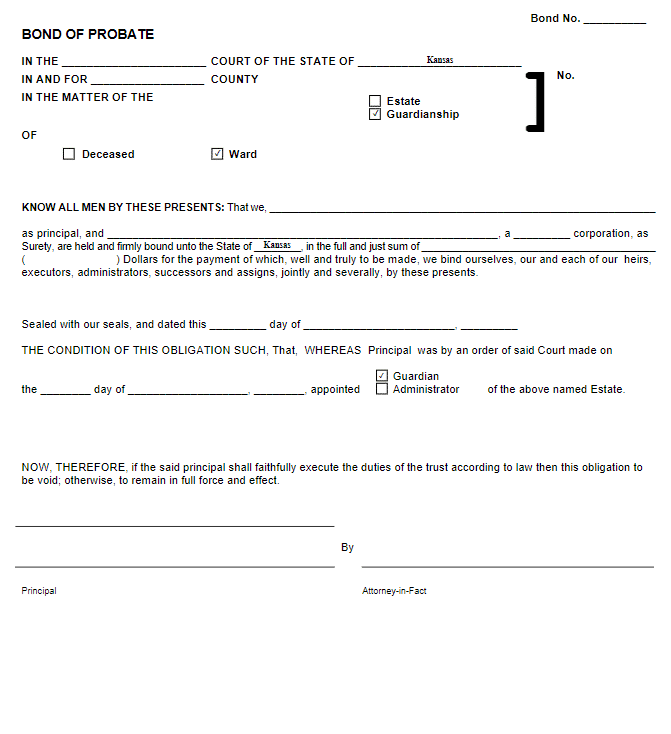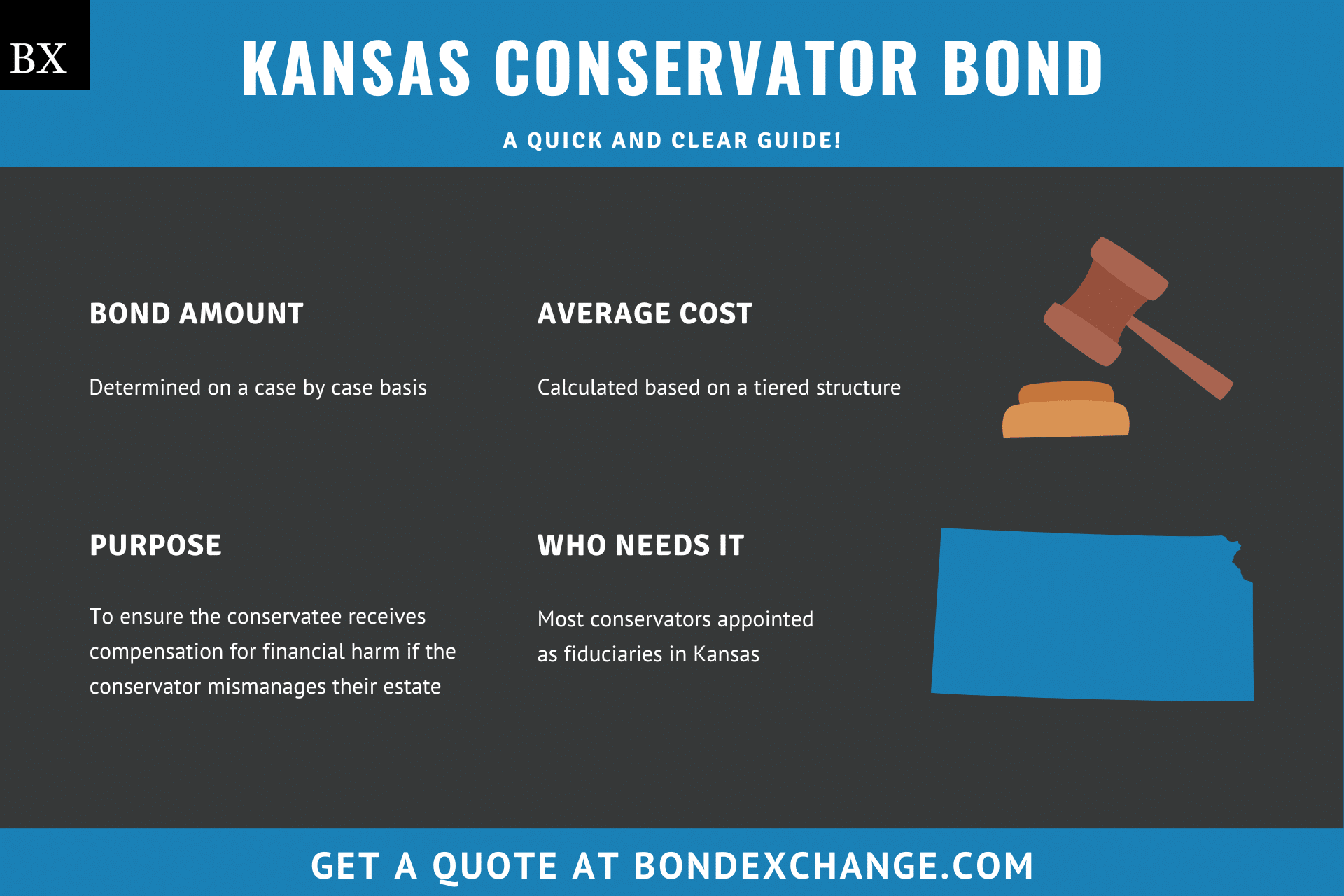Kansas Conservator Bond: A Comprehensive Guide
This guide provides information for insurance agents to help their customers obtain a Kansas Conservator bond.
At a Glance:
- Average Cost: Calculated based on a tiered structure
- Bond Amount: Determined on a case-by-case basis (more on this later)
- Who Needs It: Most conservators appointed as fiduciaries in Kansas
- Purpose: To ensure the conservatee receives compensation for financial harm if the conservator mismanages their estate
- Who Regulates Conservator Bonds in Kansas: The district court of the county where the conservatee resides or has property

Background
Kansas Statute 59-3057 requires all conservators to be appointed by a court and swear an oath before assuming their fiduciary duties. The Kansas legislature enacted the appointment requirement to ensure that conservators act in the conservatee’s best interests when managing their estate. To provide financial security for the enforcement of this requirement, most conservators must purchase and maintain a probate surety bond before becoming appointed as a fiduciary.
What is the Purpose of the Kansas Conservator Bond?
Kansas requires most conservators to purchase a surety bond as a prerequisite to being appointed as a fiduciary. The bond ensures that the conservatee will receive compensation for financial harm if the conservator fails to abide by the regulations outlined in Kansas Statute 59-3069. Specifically, the bond protects the conservatee if the conservator fails to adhere to all court orders or mismanages the estate’s assets.
For example, if a conservator uses money from the conservatee’s bank account to pay for the conservator’s personal expenses or mixes the estate’s funds with their own, the conservatee can file a claim against the conservator’s bond to recoup their losses. In short, the bond is a type of insurance that protects the conservatee if the conservator does not fulfill their fiduciary duties.
How Can an Insurance Agent Obtain a Kansas Conservator Bond?
BondExchange makes obtaining a Kansas Conservator bond easy. Simply log-in to your account and use our keyword search to find the “Conservator” bond in our database. Don’t have a login? Gain access now and let us help you satisfy your customers’ needs. Our friendly underwriting staff is available by phone (800) 438-1162, email or chat from 7:30 AM to 7:00 PM EST to assist you.
At BondExchange, our 40 years of experience, leading technology, and access to markets ensures that we have the knowledge and resources to provide your clients with fast and friendly service whether obtaining quotes or issuing bonds.
Not an agent? Then let us pair you with one!

Click the above image to find a BX Agent near you
How is the Bond Amount Determined?
Kansas Statute 59-3069 dictates that the bond amount must equal 125% of the value of the estate’s personal property plus the estimated income to be generated by the estate over the next year. The bond amount may be reduced by the value of any reasonably expected expenses that the conservator will incur while administering the conservatee’s estate, and the value of these expenses will be confirmed by the court before the amount is reduced.
What are the Underwriting Requirements for the Kansas Conservator Bond?
Most surety companies will examine the following factors when determining eligibility for the Kansas Conservator bond:
- Conservator’s credit history
- Whether or not the estate has an attorney
- Whether or not the conservator is a family member
- The conservator’s occupation
- Whether or not the conservator is replacing a prior fiduciary
- If the conservator has ever committed a felony
- Whether or not there is any ongoing business in the estate
- If a creditor is requiring the bond
How Much Does the Kansas Conservator Bond Cost?
Surety companies typically determine the premium rate for Conservator bonds based on a tiered structure, so larger bond amounts will be charged a lower premium rate than smaller bonds.
The following table illustrates the pricing structure for the Kansas Conservator bond:
$1,500,000 Conservator Bond Cost
| Bond Amount | Premium Rate | Total Bond Cost |
|---|---|---|
| First $20,000 | 0.75% | $150 |
| Next $40,000 | 0.60% | $240 |
| Next $140,000 | 0.50% | $700 |
| Next $300,000 | 0.375% | $1,125 |
| Next $1,000,000 | 0.25% | $2,500 |
| Total cost of $4,715 |
Who is Required to Purchase the Bond?
Kansas requires most conservators to purchase a surety bond as a prerequisite to becoming a court-appointed fiduciary. To paraphrase Kansas Statute 59-3051, a “conservator” is an individual or corporation appointed as a fiduciary to act or make decisions over a conservatee’s estate, including money, personal, and real property.
Additionally, a “conservatee” is defined as a minor, an impaired adult, or a person who voluntarily requested conservatorship that is incapable of making sound decisions concerning their estate. Conservators are not required to purchase a surety bond, unless explicitly required by the court, if:
- The conservatorship is voluntary and the conservatee requested to waive the bond requirement
- There is no property in the conservatee’s possession at the time of appointment and the court finds that the conservatee will receive property at some point in time
- The conservator is appointed by will and the will waives the bond requirement
- The conservator is a bank with trust authority or a trust company located in Kansas
- The appointed conservator is under contract with the Kansas Guardianship Program
Kansas Statute 59-3069 authorizes the court to require a bond at any point after appointing the conservator if they determine that doing so is justified.

How do Kansas Conservators Become Appointed as Fiduciaries?
Conservators in Kansas must navigate several steps to become appointed as fiduciaries. Below are the general guidelines, but appointees should refer to the appointment statutes or the Kansas Judicial Council’s website for details on the process.
Step 1 – Hire an Attorney
Although not explicitly required, it is highly recommended that conservators hire an attorney to assist with the conservatorship process.
Step 2 – Determine Priority
Priority to serve as a conservator is granted in the following order:
-
- A nominee of the proposed conservatee made within a durable power of attorney
- The nominee of a natural guardian
- The nominee of a minor who is the proposed conservatee, if the minor is over 14 years of age
- The nominee of the spouse, adult child, or another close family member of the proposed conservatee
- The nominee of the petitioner
Step 3 – File a Petition for Appointment
Persons seeking a conservatorship over a proposed conservatee must file a petition for an appointment with the district court of the county where the conservatee resides or has property. Conservators can obtain the necessary forms online here or from the district court, and must include the following information:
-
- Personal information of the proposed conservatee and their relatives
- Personal information about the person seeking conservatorship
- General statement and evaluation of the person’s estate and condition
- The reasoning for why a conservatorship is necessary
- Any additional information requested by the court
Conservators must also complete a basic training program before being appointed as a conservator, and reading this instructional handbook provided by the Kansas Judicial Council meets this requirement. The court may also require the conservator to submit a proposed conservatorship plan outlining how the estate will be managed.
Step 4 – Notify the Protected Person
After submitting the required items to the court, persons seeking conservatorship must have another adult, known as a server, notify the conservatee of the proceedings. The court will determine who will be the server and may order any of the following people to provide notice:
-
- The petitioner or the attorney for the petitioner;
- The attorney appointed by the court to represent the proposed conservatee
- Any law enforcement officer
- Any other person whom the court finds to be a proper person to serve this notice
Step 5 – Attend a Hearing
Conservators must attend a hearing conducted by the district court and present evidence as to why the conservatee is in need of conservatorship. The court will examine the evidence presented by the conservator as well as that presented by the conservatee being evaluated (if any) and make a determination as to whether or not conservatorship is necessary.
Any interested person can apply to the court to participate in the hearing. If the court finds a basis for the appointment, it will issue a letter of conservatorship to the petitioner.
Step 6 – Purchase a Surety Bond
Unless otherwise exempt, conservators must purchase and maintain a surety bond (limits outlined above).
How do Kansas Conservators File Their Bonds?
Conservators should submit their completed bond forms, including the power of attorney, to the district court of the county where the conservatee resides or has property
The surety bond requires signatures from the company that issues the bond and the applicant. The surety company should include the following information on the bond form:
- Legal name of the entity/individual(s) buying the bond
- Surety company’s name and state of incorporation
- Bond amount
- Date the bond is signed
- Date of the appointment
- Type of fiduciary relationship
- Name and county of the district court
What can Kansas Conservators do to Avoid Claims Made Against Their Bonds?
To avoid claims against their bonds, conservators in Kansas must ensure that they:
- Perform all of their fiduciary duties
- Obey all court orders
- Do not mismanage the estate’s assets
